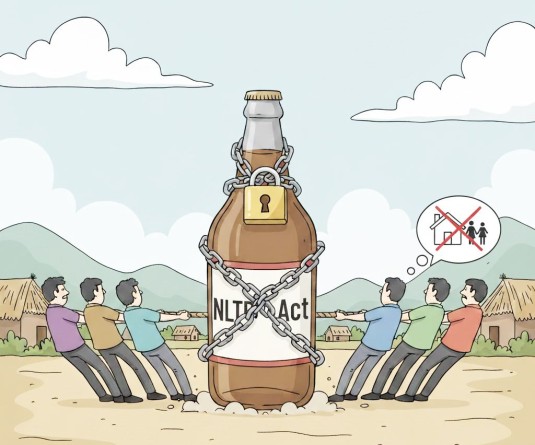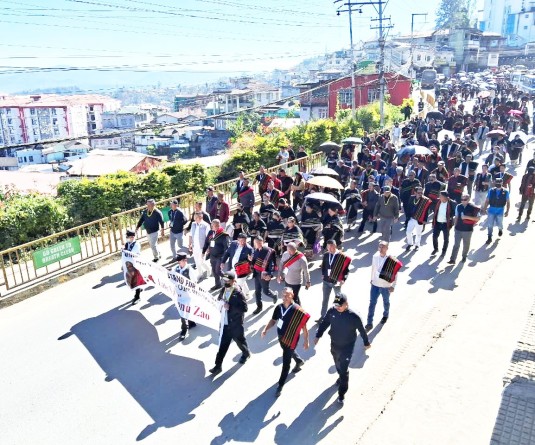
Morung Express News
Dimapur | September 15
Noted Naga scholars and social workers aired their views today on the historical, cultural, political and religious aspects of the Nagas in a symposium titled ‘Nagas on the move,’ with the seven-decade journey of the Naga political struggle forming the backdrop of the discourse.
Resource persons of the symposium held at Covenant Hall, CHSS, on Friday included Dr. Visier Sanyü, scholar and author; Rev. Dr. Wati Aier, founder Oriental Theological Seminary, Dimapur, and convenor Forum for Naga Reconciliation; Niketu Iralu, peace activist; social worker, and Prof. Xavier P Mao, HoD Philosophy, NEHU; and Dr Aküm Longchari, Editor, Morung Express, as moderator.
With majority of the participants in the symposium comprising of students, the moderator in his introductory note said the symposium offered a good opportunity for an inter-generational dialogue. Dr. Longchari said the theme of the symposium reflects the ‘Naga caravan’ (Naga struggle) which has been hijacked and diverted from its original course and is now swaying between the original route and diverted route.
He viewed that the present Naga dilemma has resulted in emergence of questions and voices – whether to go back to the original route, follow the route of diversion or take a new route. He stressed on the need to ponder on “whether the direction in which we are moving reflects our needs and aspirations.”
Presenting the historical aspect, Dr Visier Sanyü likened Naga nationalism and Naga identity to a catch 22 situation. “Did Naga nationalism create our identity or vice versa? In order to preserve our identity we formed Naga nationalism, but in return Naga nationalism gave us our identity”, he said and added that the outside world knows about Nagas because of their political struggle.
Sanyü further observed that the spirit of ‘Nagas on the move’ is still reflected in the Naga people’s generosity and hospitality and caring for the forgotten and neglected. The historian further said Nagas in Myanmar, the so-called forgotten and neglected lot, have progressed tremendously in the last 30 years and are now making the Nagas proud in the global arena: “We will look upto them…..Nagas on the move without borders”, he said.
Dwelling on the religious aspect, Rev. Dr. Wati Aier was of the view that the collective experience of Naga Christians is “very subjective” with the basic concern centering on “I”, “me” or ‘my soul.” Rev. Aier noted that the majority of Naga society feels that the Church should shy away from anything to do with politics. “Our brand of Christianity must transform people…..Christianity must be shown in the market place and in taxi stands”, he exhorted the young participants.
Niketu Iralu who spoke on the political aspect made it clear that while other struggles by different groups in other parts of India may be termed as secessionists, the Naga struggle is not a secessionist movement. “We are not anti-India, we are your (India) little neighbor, that is the Naga story”, he said.
He said the Naga struggle started well and at the right time but along the way, the movement got damaged and blame game started. To bring the healing process, Iralu said Nagas must understand the magnitude of the challenge ahead and each Naga tribe must retrospect and admit their mistakes.
Prof. Xavier P Mao meanwhile said that just like any other society or race, Nagas too have positive and negative social and cultural practices.
While negative practices should be slowly done away with, Xavier said if positive social practices do not form part of our lives, then things go wrong. While Nagas have much positive social practices, he noted that the spirit of self -sacrifice seems to be missing.
Dimapur Deputy Commissioner, Kesonyu Yhome, who also spoke at the event, expressed concern that though the state’s gross domestic product (GDP) has registered admirable growth rate over the years, this growth has not impacted or touched the common man.
The DC said as per the 6th Economic Survey of Nagaland, the state’s GDP in 2015-16 rose to Rs. 20,000 as compared to Rs. 11,500 in 2011-12 and that the state registered an annual growth rate of 10% in 2015-16. But if one looks at Naga society and development parameters, Yhome said this economic growth may not have gone down to the people, as the divide between the haves and haves not has widened. He said this suggested that the state’s growth rate is an exclusive growth, where only a section of society reaped the economic benefits.
One of the major challenges facing the state is therefore how to ensure that the resources of the state are shared proportionately among all sections of society, the DC said.
Similarly in the education sector, the DC said despite the exponential growth of the state’s literacy rate from 10.51% in 1951 to 79.55% in 2011, there appears to be no meaningful translation in action on the ground.
To bring about equity and fight the various ills plaguing society, Yhome called for constructive synergy and for all citizens collectively work towards bringing about much-needed change.


.jpg)


.jpg)
